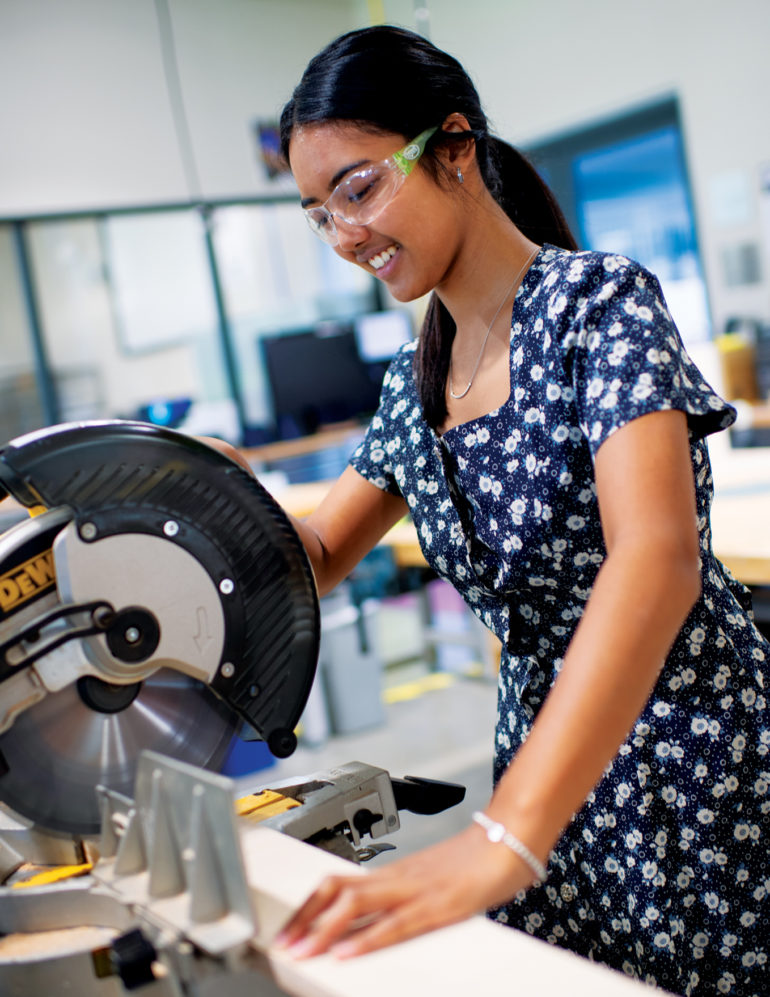By Diza Hendrawan ’20
I first visited Punahou in the spring of seventh grade as a prospective student, after a winter whirlwind of interviews and SSAT test-taking. While calculating the pros and cons of Punahou, I visited the robotics lab with my tour guide, Chloe Loughridge ’19. Earlier, we had prattled on about our mutual excitement about STEM (Science, Technology, Engineering and Math), innovation and the illustrious tech world, likely one of the reasons we were deemed a compatible match.
At Gates Learning Center, I met the two teachers who would soon become instrumental figures in my pursuit of design thinking – Mr. Dengler, who just retired this past year, and Mr. Lai. They assured me that at Punahou, there would always be a place for me to explore my interest in designing and building – an inclination that I believe most kids are born with, but one that isn’t always nurtured.
Prior to that visit to Punahou, I took part in STEM in a variety of ways, from robotics summer camp, where I built and pseudo-coded a bionic dog, to learning HTML and CSS (Cascading Style Sheet). I was able to embrace my curiosity through these pursuits, along with my other more traditional fascinations with art, dance and writing.
In middle school, my mom urged me to concentrate on what interested me, because she knew it was the time when many girls start to believe there isn’t a place for them in STEM. I knew what she meant. Despite recent attempts to encourage girls to excel in engineering and the abundance of women behind history’s most influential STEM developments, there still exists a history of stigma against women in the field.
While chatting with three kind strangers in a building completely foreign to me, I felt genuinely welcome. It seemed familiar, like I was where I was meant to be. I enrolled at Punahou in the eighth grade, and I was placed in engineering electives for two consecutive trimesters. In these classes, Mr. Lai and Mr. Dengler introduced me to programmable LEGO Mindstorm robots and Onshape computer-aided design (CAD), along with the freedom to succeed and fail at both. There was never a day when I knew everything would operate perfectly, but I was so excited to come in and try.
After what felt like a promising trial run, I was ready for a bigger challenge during my freshman year. In my engineering projects class, I collaborated with other Academy students across grade levels to work on a robot for the FIRST Tech Challenge, a national robotics competition. Our team overcame the disparities in our experience and maturity to build a robot that could perform such tasks as pushing around yoga balls, shooting Wiffle Balls and defending itself. That year at the state competition, my team persevered through eliminations and ultimately won the championship. A group of us decided to try it all again the next year, outside the structure of the engineering class. Three of those students have become my best friends.
Since then, I’ve continued to challenge myself with robotics – participating in the FIRST Tech Challenge with a small team and small robot and the FIRST Robotics Competition with a school-wide team and enormous robot. I’m also taking part in coding and cybersecurity competitions with a group of close friends, and working as a teaching assistant for design thinking at Punahou’s D. Kenneth Richardson ’48 Learning Lab.
I am incredibly grateful for how my curiosity was encouraged by my teachers, who are dedicated to creating accessible opportunities for students in the realm of STEM. While Mr. Lai, Mr. Dengler and the rest of the inspiring faculty have provided vital support as we experience both failure and success, they also have encouraged respect and responsibility in us.
Recently STEM has evolved into a buzzword, often glamorized as a flashy and lucrative, yet unforgiving, industry that waits for no one. Punahou teachers have guided us with values that act as our moral compass as we venture into uncharted future careers in STEM. They have taught us that engineering and robotics are about improving models and devising efficient solutions to problems, not just about winning competitions. We learned to use our skills to help others, and to appreciate that these skills aren’t available to everyone. A passion for design thinking inspired me to begin my Punahou journey, and it has no doubt nourished my mind, character and given me confidence to claim a place in the world of STEM – a place that I learned I already have.

